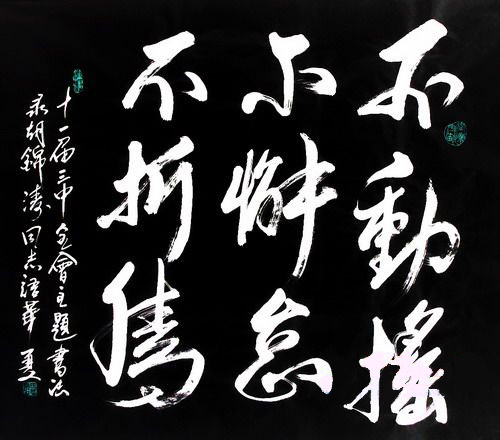More Popular Catchphrases in China
1.富二代 fù èr dài
富二代is Affluent 2nd generation.
Affluent 2nd generation is the children born after the 1980s who have inherited much wealth from their parents (the affluent 1st generation) and are beginning to exert their influence.
A new report from the “Forbes” Chinese version of the initial public release “China’s luxury market survey” that China is becoming the luxury goods industry, the most vibrant in the present and the future of the territory, “rich second-generation” gradually become China’s consumption of luxury goods an important force, beyond their own economic strength of luxury consumption, “the back of the audience,” continued into the Chinese luxury consumption constitutes a new force.
World Luxury Association report shows that, as of the end of January this year, China’s luxury goods consumption in the total 8.6 billion, the global share of 25% of the share for the first time surpassed the United States, ranking runner-up the throne, behind Japan. The report shows that: China’s richest annual average consumption of 2 million yuan. Among them, expensive cars, watches and other luxury goods is the biggest spending item.
Chinese luxury goods market, consumption of this inner energy, is also based on Chinese luxury consumers in the distribution of an increasingly wide range. Forbes has just been released, according to research analysis, through many rounds of tests and opportunities, the initial wealth generation has created a lot of money of social wealth, “rich second-generation” have become an important force in China’s consumption of luxury goods, beyond its own economic strength for luxury consumption, “the back of the audience,” continued into the Chinese luxury consumption constitutes a new thrust. The report also noted that the second-tier cities in the awareness level of luxury and consumption is rising.
Previously only first-tier cities in China to stay luxury brand CEO who are now coming to the Nuggets second-tier cities, while domestic use of less-affluent cities of people travel to buy luxury goods from overseas has also been uncommon to spend thousands of tens of thousands of pieces of money to buy a LV bag or a Coach bag is not something new.
2. 婚奴 hūn nú

It means “wedding slave “. In our previous entry of Popular Catchphrases in China, there was a mention on房奴(fáng nú) which refers to a group of people who spend a large part of their family income paying their mortgage.
In some Chinese cities, especially large ones like Shanghai, quite a few young couples run into huge debts after throwing a luxurious wedding well beyond their means. So after the marriage, the newly-weds have to slave away to pay off all the bills.
3. 考碗族 kǎo wán zú
The Chinese words in the picture reads: Civil Servant
In actual face, 考碗族 (kao wan zu) means a Stable Job Seeker.
Many people dream of becoming a civil servant or working in a state-owned company because these jobs mean less pressure and stable earnings. Some of them attend the civil servant recruitment exam every year even thought they have already got a job.
A record high of 1.46 million people qualified to take the national civil servant exam for the year 2010. That was about 16 times more than the number of 87,000 people who qualified in 2003, according to xinhuanet.com.
Most Chinese consider civil service jobs to be stable and rewarding. Competition for them has increased each year. This year, only one out of every 93 people who will take the exam is expected to be offered a job next year in the central government or those organizations directly attached to it.
1.05 million people qualified to take the exam in 2008, but only one out of 77 passed and was offered a job in 2009. 80 million people qualified in 2007, and one out of 60 was offered a position in 2008, while 60 million people were entitled to take the exam in 2006 and just one out of 42 passed in 2007.
4. 卧槽族 wòcáo zú
This is a twist on the Chinese word for “job hopping,” this term means “job-hugging” as many people now cling to their current jobs because companies no longer hire new staff due to global economic crisis.
Despite being unhappy with terms & benefits of the current job, but before the Spring festival most employees will be given bonuses for their hard work over the year. Even if one decides to leave, he or she will do it after collecting the bonus. Hence, every year after the Spring festival, there will be many people looking for jobs.
Why do more people hop from job to job instead of sticking to one job all their lives? Some people still think that it is important to stay in one job or career to become an expert, but more and more people are trying different jobs before settling down.
5. 啃老族 kěn lǎo zú

Acronym of “Not in Employment, Education or Training”. It refers to the young people who do not work but live off their parents.
An investigation indicates that about 70% of the unemployed young people in our country now live off their parents, thus becoming Neets.” The boomerang child phenomenon has become a social problem on a nationwide scale.
It was first used in the United Kingdom but its use has spread to other countries, including Japan, China, and South Korea.
In the United Kingdom, the classification comprises people aged between 16 and 24 (some 16 year olds are still of compulsory school age). In Japan, the classification comprises people aged between 15 and 34 who are unemployed, unmarried, not enrolled in school or engaged in housework, and not seeking work or the technical training needed for work. The “NEET group” is not a uniform set of individuals but consists of those who will be NEET for a short time while essentially testing out a variety of opportunities and those who have major and often multiple issues and are at long term risk of remaining disengaged.
6. 装嫩 zhuāng nèn

It’s simply the act of ‘acting young’.
Some ladies, particularly those married middle-aged ones, like to wear colourful, flamboyant clothes. They use language and flash gestures and act in a way that is more suitable to people of a much younger age. They are described as “pretending to be young & tender,” as this Chinese term means literally.
Adults tend to face a lot of harsh reality in life, so it’s no wonder to see more people trying to act young. Their kiddish behaviour probably reflects their desire of going back to their childhood. It may not necessary be bad in this stressful society. However if this psychological behaviour takes on extreme, this individual may reject growing up.
7. 人肉搜索 rén ròu sōu suǒ

“Human flesh search engines” is a term used to describe sites where internet vigilante mobs track down and publish personal details such as name, home address, workplace, phone number, etc of those they believe have engaged in some kind of behavior worth punishing.
Needless to say, the mob may not always have its facts right, and even if it does, there are privacy issues involved that will be treated differently by different legal systems.
For example, a notorious case of the high-heeled kitten killer that happened in 2006 of a video of a pretty woman in sexy clothes caressing a kitten’s fur along a riverbank. Then she puts the kitten on the ground and stomps on its head with her high-heeled shoes and crushed it to death at last.
The video was later posted on the Internet and could be downloaded for free. It was used to attract viewers to a Website that featured videos of small animals being stomped to death by aggressive women. The Website, which sold the discs for 15 yuan each, is no longer operating.
Immediately after the video was posted several weeks ago, enraged animal lovers began tracking down those involved in making the video.
The actress and the video’s producer were traced to Luobei County in the northern province. The woman, a Heilongjiang Province nurse named Wang Jue, said she was despondent over a failed marriage and allowed herself to be talked into crushing the animal to death while the cameras rolled.
8. 走班族 zǒu bān zú
 These people refer to being walking commuters. They are actually a bunch of health conscious who prefer to go to and from work by foot. Yes, their form of transport is not car, not bike, not taxi, not bus, but their own feet.
These people refer to being walking commuters. They are actually a bunch of health conscious who prefer to go to and from work by foot. Yes, their form of transport is not car, not bike, not taxi, not bus, but their own feet.
At 7:50 am on September 22, Lin Yuan, who lives in Sanxia Square, Shapingba District, left her house as she always does, and walked over 40 minutes to an office building located at Fengtian Road. The number of “walking commuters,” like Lin, who go to work not by squeezing into packed buses and by driving cars, but by walking every day, is growing in Chongqing Municipality. According to sources, the number of “walking commuters” in Chongqing has exceeded 5,000.
Lin, 27, is a civil servant working for the Shapingba District government, and walked to work for over two years. She walks for over 40 minutes every morning, and then retraces her steps when she gets off work in the evening. For over two years, Lin walked to work every day except for strong winds and heavy rains.
Lin said that previously, she squeezed into a bus every morning. Later, she discovered through a TV program that “walking” is a healthy and eco-friendly way to go to work, and tried it for several days. Because Lin felt good, she stuck to it. “During the last two years, I knew several new friends on my way to work, and my weight has gone down from 56.5 to 49 kilograms.” Lin’s several friends that live nearby also do exercise by walking to their working places.
Lin said that actually, many of the “walking commuters” in Chongqing own a car. Walking to work is a lifestyle, which not only lets them breathe the fresh air, but also relieves psychological pressure as well as reduces emissions from tailpipes. However, Lin suggested that if you want to be a “walking commuter,” your house should be near to the place where you work, or you will be very tired.
Through a “walking commuters” forum on a website, reporters got in contact with many walking commuters from Chongqing. A netizen nicknamed “Qiao Duoduo” told the reporter that she lives in Jiefangbei Pedestrian Street, and the office building where she works is located on Jiaochangkou. She walks 10 minute to work every day, which makes her very happy because this enables her to not only exercise, but also contribute to making the city’s public transportation less crowded.
The people, labeled as “working poor”, are economically disadvantaged despite the fact that they are fully employed. The working poor do not have sufficient income to improve their overall lifestyle.
Recently, some netizen came up with symtoms of people labeled as ‘working poor’.
- Working for more than 54 hours a week, without prospects;
- No salary raise within a year;
- No promotion for three years;
- Low salary, living a hard life by the end of the month;
- Little savings, without property;
- Not low salary, but spend money extravagantly;
- Not low income, without a sense of security;
- Extremely busy, feel guilty once stop for a while;
- Work in the day time, continue with the work when come back home in the evening;
- Always plan to do the great work, but can’t finish the work in hand.
Are you a ‘working poor’ employee too?
The Flying-Fish Clan. This term, deriving from the title of a novel “Poissons Volants sur Paris,” refers to those Chinese who give up their well-established careers in their home country and go overseas to study in elite foreign universities.
It’s probably a kind of challenge for these people to instill more excitement and adventure in their lives in a foreign land. Even if it doesn’t come across as a challenge, some people would just want to move on to another chapter of their life to fulfil what they want to do which they probably didn’t have the chance to do it before. Perhaps, this itself is consider a kind of achievement.









